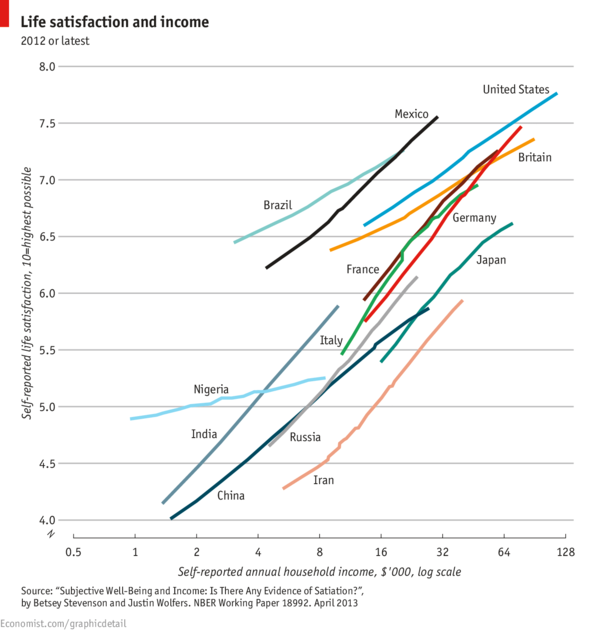Recently, I wrote about relative wealth and happiness. A new NBER paper, by Stevenson and Wolfers, seems to belie this view. It shows a sharp increase in happiness with increasing income:
 But these data are consistent with the idea that relative wealth plays an important role in happiness. Americans are much wealthier now than they were, say, before World War II. But there has not been a commensurate increase in happiness. But at any point in time, wealthy people are happier, on average, than less wealthy ones. Relativity still matters.
But these data are consistent with the idea that relative wealth plays an important role in happiness. Americans are much wealthier now than they were, say, before World War II. But there has not been a commensurate increase in happiness. But at any point in time, wealthy people are happier, on average, than less wealthy ones. Relativity still matters.
Behavioral Economics and the Relativity Theory of Happiness
 According to many traditional economic theories of human nature, higher income should make people happier. That’s because with every additional dollar we make, we can purchase goods that increase our “utility.” Or we can save more money, and reduce anxiety about our financial future.
According to many traditional economic theories of human nature, higher income should make people happier. That’s because with every additional dollar we make, we can purchase goods that increase our “utility.” Or we can save more money, and reduce anxiety about our financial future.
But of course, once people have enough money to meet the basic necessities, the relationship between additional money and additional happiness gets more complicated. For instance, for many people with high incomes, how happy they are with their earnings depends on the size of their earnings compared to their peers.
Consider a banker who wrote an op-ed in the New York Times a while ago, complaining about his income:
“In my last year on Wall Street my bonus was $3.6 million — and I was angry because it wasn’t big enough.”
The problem of course isn’t the size of the bonus, but the size of his best friend’s bonus, or the size of the bonus he got the previous year.
Traditional economics still provides us with wonderful tools to understand human behavior. We just have to remember to reach into our toolbox for other insights into human nature, to better grasp how people think, decide and behave.
Heart-Wrenching Words from Beethoven on Deafness
 It is an awful irony that Ludwig van Beethoven, who I consider the greatest composer in the history of the world, experienced deafness from an early age, a disability that did not seem to interfere with his musical productivity one whit. But it certainly cost him a great deal of suffering, as is quite apparent in this quote:
It is an awful irony that Ludwig van Beethoven, who I consider the greatest composer in the history of the world, experienced deafness from an early age, a disability that did not seem to interfere with his musical productivity one whit. But it certainly cost him a great deal of suffering, as is quite apparent in this quote:
O you men who think or say that I am malevolent, stubborn or misanthropic, how greatly do you wrong me. You do not know the secret cause which makes me seem that way to you…. For 6 [sic] years now I have been hopelessly afflicted, made worse by senseless physicians, from year to year deceived with hopes of improvement, finally compelled to face the prospect of a lasting malady (whose cure will take years or perhaps be impossible). Though born with a fiery, active temperament, even susceptible to the diversions of society, I was soon compelled to withdraw myself, to live life alone…. It was impossible for me to say to people, “Speak louder, shout, for I am deaf.” Ah, how could I possibly admit an infirmity in the one sense which ought to be more perfect in me than in others, a sense which I once possessed in the highest perfection…. For me there can be no relaxation with my fellow-men, no refined conversations, no mutual exchange of ideas. I must live almost alone like one who has been banished.
Painful to read. A man who already had difficulty interacting with other humans, to be further isolated by deafness, an isolation increased by his embarrassment that his affliction involved the main sense relevant to his art and his livelihood.
